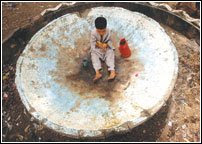
By Anees Jillani
Most children work. At the age of six or seven they start helping parents in the house by running errands and doing small chores.In traditional societies involved in agriculture and handicraft production, they work under their parents’ supervision, learning family trade. In other developed societies, children work in their spare time to earn extra money, at the same time learning the value of work.Child labour, however, implies something different as it entails children being exploited or overworked, or deprived of their right to health or education or just childhood. These children, apart from working at a very young age, work long hours, at little or no pay; and work in hazardous and slave-like conditions. These children are compelled to work on a regular basis to earn a living for themselves or for their families, and as a result are disadvantaged educationally and socially. Their places of work are exploitative and damaging to their health and to their physical and mental development. Separated from their families and often deprived of educational and training opportunities; these children are forced to lead prematurely adult lives, and condemned to a cruel present and a bleak future.Many justify the existence of child labour on grounds of poverty, without realising that child labour itself may become a cause of poverty. A sizeable number of Pakistan’s population lives in abject poverty; and their children have to work for the survival of their families. This situation deprives them of choice and increases the employers’ hold over them; enabling the employer to pay meagre wages to these child workers.The rise in employment of children at low wages creates a cycle in which already inadequate adult wages are further depressed to a point where a single adult salary is not sufficient to sustain a family. Hence child labour leads adult under-employment and unemployment.As long as children are put to work, poverty will spread and living standards will continue to decline. It should, however, be appreciated that not all children work to support their families. Some enter the workforce due to lack of opportunities for free, quality and compulsory education.The quality of available education remains irrelevant and unsuited to the needs of the child. Even if compulsory education were made available, it will not be considered by many parents as a worthwhile investment because the system does not impart relevant, marketable skills and knowledge. Competent, caring and qualified teachers are missing and the quality of curriculum is poor.This, coupled with growing urbanisation, and its accompanying pattern of social transition, rapid population growth, resource constraints, commercialisation of agriculture and growth of landless peasantry, traditional hesitation in educating females, unemployment of adults and low income makes Pakistan one of the few countries in the world with child labour on the increase.The magnitude of the problem is immense due to the numbers involved, although the government, regardless of who is in power, always denies the magnitude of the problem, insisting that it is blown out of proportion.
Most children work. At the age of six or seven they start helping parents in the house by running errands and doing small chores.In traditional societies involved in agriculture and handicraft production, they work under their parents’ supervision, learning family trade. In other developed societies, children work in their spare time to earn extra money, at the same time learning the value of work.Child labour, however, implies something different as it entails children being exploited or overworked, or deprived of their right to health or education or just childhood. These children, apart from working at a very young age, work long hours, at little or no pay; and work in hazardous and slave-like conditions. These children are compelled to work on a regular basis to earn a living for themselves or for their families, and as a result are disadvantaged educationally and socially. Their places of work are exploitative and damaging to their health and to their physical and mental development. Separated from their families and often deprived of educational and training opportunities; these children are forced to lead prematurely adult lives, and condemned to a cruel present and a bleak future.Many justify the existence of child labour on grounds of poverty, without realising that child labour itself may become a cause of poverty. A sizeable number of Pakistan’s population lives in abject poverty; and their children have to work for the survival of their families. This situation deprives them of choice and increases the employers’ hold over them; enabling the employer to pay meagre wages to these child workers.The rise in employment of children at low wages creates a cycle in which already inadequate adult wages are further depressed to a point where a single adult salary is not sufficient to sustain a family. Hence child labour leads adult under-employment and unemployment.As long as children are put to work, poverty will spread and living standards will continue to decline. It should, however, be appreciated that not all children work to support their families. Some enter the workforce due to lack of opportunities for free, quality and compulsory education.The quality of available education remains irrelevant and unsuited to the needs of the child. Even if compulsory education were made available, it will not be considered by many parents as a worthwhile investment because the system does not impart relevant, marketable skills and knowledge. Competent, caring and qualified teachers are missing and the quality of curriculum is poor.This, coupled with growing urbanisation, and its accompanying pattern of social transition, rapid population growth, resource constraints, commercialisation of agriculture and growth of landless peasantry, traditional hesitation in educating females, unemployment of adults and low income makes Pakistan one of the few countries in the world with child labour on the increase.The magnitude of the problem is immense due to the numbers involved, although the government, regardless of who is in power, always denies the magnitude of the problem, insisting that it is blown out of proportion.

No comments:
Post a Comment